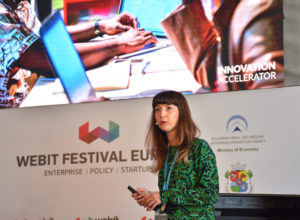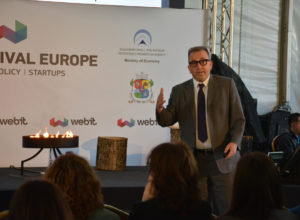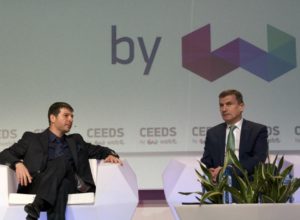Tag: Digital Economy Leadership Summit
Innovation should be used to find a solution to world hunger
As surprisingly as it might sound, in 2017 one in every nine people is deprived from access to a nutritious meal on a daily basis.
There are different reasons behind this phenomenon. Natural disasters caused by climate change affect the most vulnerable people around the globe. One major consequence of conflict is hunger. The big conflict in the Middle East affects not only Syria, but also its neighbouring countries - Lebanon, Jordan and Turkey.
In reality, 20 million people worldwide are on the break of famine. During Webit.Festival Europe 2017 the Private Sector Partnerships and Innovation Accelerator Lead at World Food Programme Hila Cohen talked about how innovation can be used to reach the sustainable development goal of zero hunger.
The World Food Programme is a United Nations agency which delivers food to people who need it the most. Trucks, ships and aircraft supply food to 80 million people a year in the most remote locations in the world. The World Food Programme needs partners like NGOs, governments and the private sector in order to find a solution to world hunger.
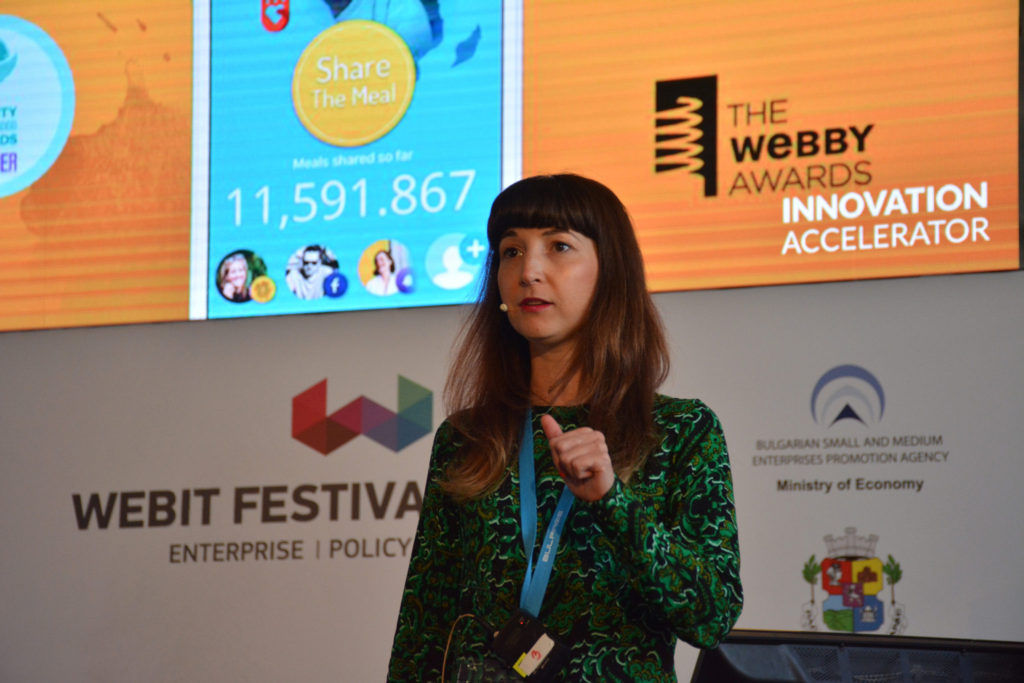 The Private Sector Partnerships and Innovation Accelerator Lead at World Food Programme Hila Cohen[/caption]
The agency has developed an app called ShareTheMeal, which takes advantage of the fact that there are more people with mobile phones than hungry people on the planet. With the app, you can donate 50 cents at a time and feed a child for a day. Up to today thanks to 50 cents donations, more than 12 million people have been fed.
Food for Tech is another project which aims to empower refugees by giving them tech skills. The idea is that these skills can be used at the current location of the refugees but also at other places they go as they migrate. The World Food Programme is looking into self-driving trucks which will be able to cope with the challenges of places where there is no real roads or a secure Internet connection.
The Private Sector Partnerships and Innovation Accelerator Lead at World Food Programme Hila Cohen[/caption]
The agency has developed an app called ShareTheMeal, which takes advantage of the fact that there are more people with mobile phones than hungry people on the planet. With the app, you can donate 50 cents at a time and feed a child for a day. Up to today thanks to 50 cents donations, more than 12 million people have been fed.
Food for Tech is another project which aims to empower refugees by giving them tech skills. The idea is that these skills can be used at the current location of the refugees but also at other places they go as they migrate. The World Food Programme is looking into self-driving trucks which will be able to cope with the challenges of places where there is no real roads or a secure Internet connection.
“Stopping world hunger is not something we can do on our own.”, Hila Cohen said.When the location of the delivery is very hard to reach, the food is dropped from the aircraft. In the case of an existing food market, a cash-based transfer is applied. People receive credit cards, a SMS system or paper vouchers which enable them to go to the market and select and buy their own food. The World Food Programme contributes to the education system’s development by introducing the school feeding concept. The idea behind it is to give food to children in schools, which would mean parents will not have to decide between sending their child to school or to work.
“Even though the world population is growing, the number of hungry people is diminishing.”, Cohen said.Regardless of this positive trend, if actions are not taken by 2030 the hungry people worldwide are estimated to be around half a billion. By opening the World Food Programme Innovation Accelerator, the agency is counting on technological innovation to help make these numbers go down. Startups related to food can receive funding and access to the field from the Innovation Accelerator. The variety of countries in which the World Food Programme operates, gives startups a great opportunity to get acquainted with a different ecosystem. [caption id="attachment_5131" align="aligncenter" width="640"]
 The Private Sector Partnerships and Innovation Accelerator Lead at World Food Programme Hila Cohen[/caption]
The agency has developed an app called ShareTheMeal, which takes advantage of the fact that there are more people with mobile phones than hungry people on the planet. With the app, you can donate 50 cents at a time and feed a child for a day. Up to today thanks to 50 cents donations, more than 12 million people have been fed.
Food for Tech is another project which aims to empower refugees by giving them tech skills. The idea is that these skills can be used at the current location of the refugees but also at other places they go as they migrate. The World Food Programme is looking into self-driving trucks which will be able to cope with the challenges of places where there is no real roads or a secure Internet connection.
The Private Sector Partnerships and Innovation Accelerator Lead at World Food Programme Hila Cohen[/caption]
The agency has developed an app called ShareTheMeal, which takes advantage of the fact that there are more people with mobile phones than hungry people on the planet. With the app, you can donate 50 cents at a time and feed a child for a day. Up to today thanks to 50 cents donations, more than 12 million people have been fed.
Food for Tech is another project which aims to empower refugees by giving them tech skills. The idea is that these skills can be used at the current location of the refugees but also at other places they go as they migrate. The World Food Programme is looking into self-driving trucks which will be able to cope with the challenges of places where there is no real roads or a secure Internet connection.
“That’s how we are dreaming. We dream big.”, Cohen said.Hydroponics is another area of interest for the agency. It enables people to grow food without soil by using water, minerals and a manageable ecosystem. The World Food Programme is testing to use the Blockchain technology to transfer money from the organisation to the people in need. You can watch her full lecture here: If you want to keep up with the latest trends in the world of digital economy and technology, then Webit.Festival is the right place for you. Visit our website and book 2 in 1 of our Super Earlybird tickets for Webit.Festival Europe 2018. Feel the Webit vibe with some of the best photos from this year’s event! [easingslider id="4954"]
Huge opportunities for investors and entrepreneurs in the Space Industry
Currently, the global infrastructure is expanding into Space. The truth is, this is something that has already started happening. The commercial activity in Space creates many opportunities for both investors and entrepreneurs. It is expected to exceed government activity by 2020.
At the 2017 edition of Webit.Festival Europe the Chairman of Space Angels Network Joe Landon talked about the entrepreneurial revolution in Space. Space Angels is a company which searches the world for the best space startups. It aims to create opportunities for the investors while enabling them to make profit from the commercial space industry.
No matter what the industry is, new technology is always considered crazy at first. The Space was once considered science fiction, now it is a science fact. To make the topic more tangible, Joe Landon shared a couple of examples of innovations in the Space industry with the audience at Webit.
The Falcon-9 Rocket was launched, landed and re-launched by SpaceX. Such reusable rockets spread the costs over the multiple launches and present a revolution in the Space industry. The Blue Origin - the space company of Jeff Bezos, the CEO of Amazon, had a similar success with its New Shepard suborbital rocket. It was launched and landed five times in a year.
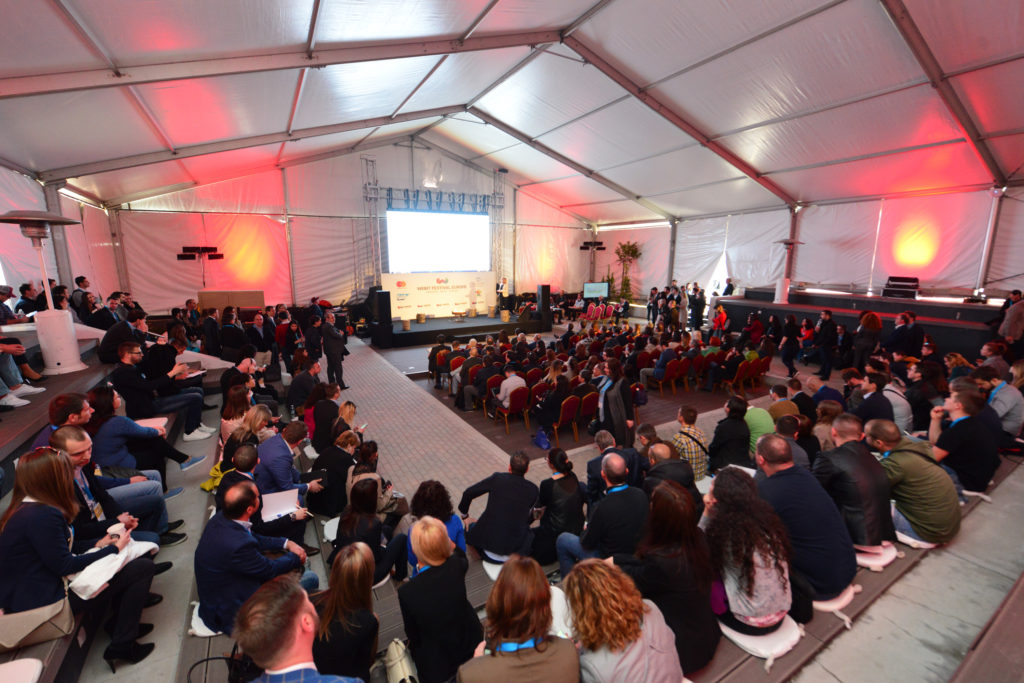 There are many forces which when acting together make Space innovations possible. Joe Landon stressed on the importance of the development in technology which reduces the costs of sending things to the Space. He emphasized on the role of the revolution in satellite technology.
Commercial communication satellites a couple of years back were very heavy and extremely expensive to make and launch. It was important for these satellites to last for 15 years and to be very reliable which required further financing.
The satellites from today can be held in a person’s hand and are far cheaper to produce and launch than their multi-million spacecraft predecessor. It is possible to launch dozens of them at the same time. This technology has a great impact on the space economy. Huge opportunities for investors and entrepreneurs arise.
There are many forces which when acting together make Space innovations possible. Joe Landon stressed on the importance of the development in technology which reduces the costs of sending things to the Space. He emphasized on the role of the revolution in satellite technology.
Commercial communication satellites a couple of years back were very heavy and extremely expensive to make and launch. It was important for these satellites to last for 15 years and to be very reliable which required further financing.
The satellites from today can be held in a person’s hand and are far cheaper to produce and launch than their multi-million spacecraft predecessor. It is possible to launch dozens of them at the same time. This technology has a great impact on the space economy. Huge opportunities for investors and entrepreneurs arise.
“Reusability in Space is very important.”, Landon said.There are innovations concerning 3D printing in Space. The company Made-in Space created a zero gravity 3D printer which enables the astronauts to print the exact tool they need in Space which lowers the costs. 3D Systems is a company which created the first manufactured object from asteroid material. The European banking center created $227 million fund to invest in space mining projects. According to a research report on the opportunities in the commercial space economy by Goldman Sachs, the costs of asteroid mining are comparable to these in Earth mines.
 There are many forces which when acting together make Space innovations possible. Joe Landon stressed on the importance of the development in technology which reduces the costs of sending things to the Space. He emphasized on the role of the revolution in satellite technology.
Commercial communication satellites a couple of years back were very heavy and extremely expensive to make and launch. It was important for these satellites to last for 15 years and to be very reliable which required further financing.
The satellites from today can be held in a person’s hand and are far cheaper to produce and launch than their multi-million spacecraft predecessor. It is possible to launch dozens of them at the same time. This technology has a great impact on the space economy. Huge opportunities for investors and entrepreneurs arise.
There are many forces which when acting together make Space innovations possible. Joe Landon stressed on the importance of the development in technology which reduces the costs of sending things to the Space. He emphasized on the role of the revolution in satellite technology.
Commercial communication satellites a couple of years back were very heavy and extremely expensive to make and launch. It was important for these satellites to last for 15 years and to be very reliable which required further financing.
The satellites from today can be held in a person’s hand and are far cheaper to produce and launch than their multi-million spacecraft predecessor. It is possible to launch dozens of them at the same time. This technology has a great impact on the space economy. Huge opportunities for investors and entrepreneurs arise.
“In ten years satellites will cost 10,000 times less, they will have 1,000 times lower mass and the launch will cost 350 times less.”, Joe Landon said.He dispelled the myth that space companies need extremely big investments in comparison to other tech companies. In fact, the seeds and Series-A investment in space startups is identical to the rest of the tech market. The truth is that space companies from the past needed a lot of funding to build the expensive infrastructure which the space companies of today use. This advantage enables them to develop low-cost, quick businesses. Another myth is that space companies take too long before making any actual profit. The numbers show that since 2009 $14 billion were accounted as exits in the Space industry.
“In the future we’d like to think there are millions of people living and working in the Space.”, Landon said.We are not talking about sending only missions to the Space, but also forming communities. Astronauts will be joined by people with all kind of expertise such as teachers, lawyers and doctors. Today, very few people go to Space. According to Landon in one or two generations there will be people who have lived their entire life only in the Space. This completely different perspective when the Earth is observed from the Space can change the way we think about it. As the Apollo 14 astronaut Edgar Mitchell said:
“You develop an instant global consciousness, a people orientation, an intense dissatisfaction with the state of the world, and a compulsion to do something about it.”You can watch his full lecture here: If you want to keep up with the latest trends in the world of digital economy and technology, then Webit.Festival is the right place for you. Visit our website and book 2 in 1 of our Super Earlybird tickets for Webit.Festival Europe 2018. Feel the Webit vibe with some of the best photos from this year’s event! [easingslider id="4954"]
The need for ethical practices in AI
Nowadays, we have access to two things. First, a big amount of data about our personal information and second - access to AI which enables us to understand far better the insights that make us who we are.
At the 2017 edition of Webit.Festival Europe the President and Global Brand Director of Havas Worldwide Jason Jercinovic, introduced the topic of ethics in the Artificial Intelligence because if this data is in the wrong hands, our privacy could be endangered.
An ethical imperative on how to use this data is necessary to be created. We should consider ethics from the perspective of both consumers and professionals to communicate in an informed way while considering the benefits and the risks which AI brings.
Jason Jercinovic stressed on the development of the tools of today which compared to those of the past can recognize unstructured data. The truth is the world of social media and interconnected devices is one of unstructured data. And these tools enable us to understand the insights from that unstructured data at a scale and to work with them.
[caption id="attachment_5137" align="aligncenter" width="640"]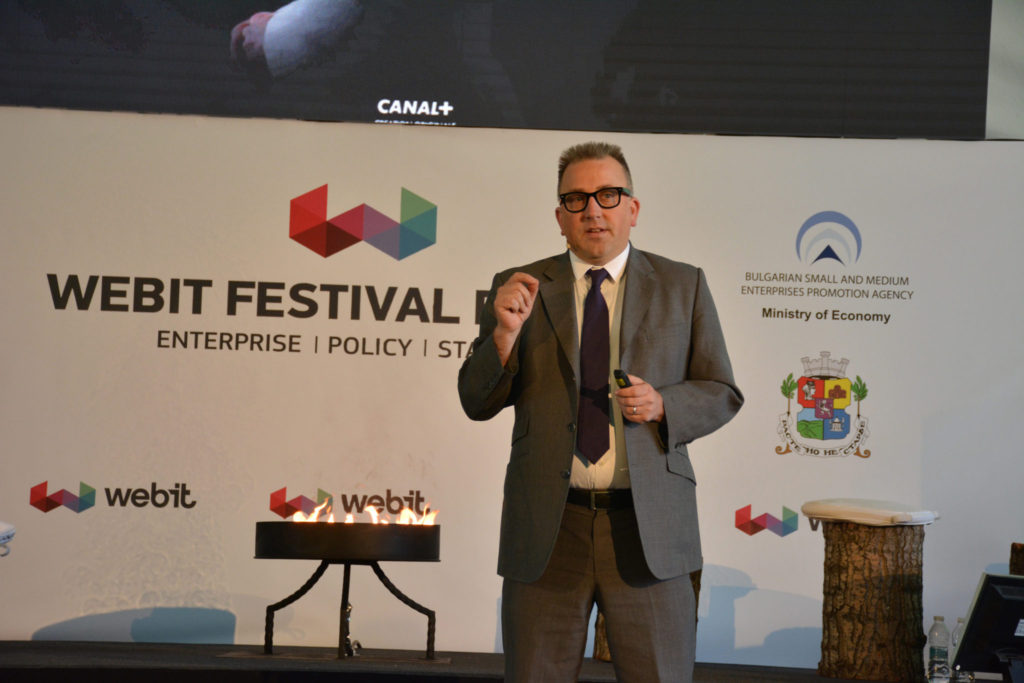 The President and Global Brand Director of Havas Worldwide Jason Jercinovic[/caption]
The vast amount of data enables us to understand people’s behaviour in great detail. Furthermore, it allows us to create and deliver experiences which are extremely efficient since they are targeted to each individual based on personal preferences.
The President and Global Brand Director of Havas Worldwide Jason Jercinovic[/caption]
The vast amount of data enables us to understand people’s behaviour in great detail. Furthermore, it allows us to create and deliver experiences which are extremely efficient since they are targeted to each individual based on personal preferences.
 The President and Global Brand Director of Havas Worldwide Jason Jercinovic[/caption]
The vast amount of data enables us to understand people’s behaviour in great detail. Furthermore, it allows us to create and deliver experiences which are extremely efficient since they are targeted to each individual based on personal preferences.
The President and Global Brand Director of Havas Worldwide Jason Jercinovic[/caption]
The vast amount of data enables us to understand people’s behaviour in great detail. Furthermore, it allows us to create and deliver experiences which are extremely efficient since they are targeted to each individual based on personal preferences.
“With that information I can predict the future. I can influence how you think.”, Jercinovic said.This technology is becoming more complex at a very fast pace. The reality is that companies are willing to use our personal information in order to target their products or services more precisely. Whether we accept this approach as ethical or not will not change the current situation. That is why, we need a code of conduct. At the end of his talk, Jason Jercinovic underlined once again the importance of making a difference between the benefits and the risks AI brings. It is no secret that this technology is used by companies to deliver high quality content and products to us, customers. AI is present in most parts of our live and it is here to make it better. To get a real idea of how AI is implemented in our daily life you can find more about eagleAi, an intelligence platform created by Havas Cognitive for ITV News. It aims to understand how consumers think and it was used during the USA elections. eagleAi processes a huge amount of posts, comments, tweets, news articles, debates and many more to determine what people are talking about and which issues they do find relevant. AiMEN is a cognitive social listening tool created by Havas Cognitive which with the help of AI discovers the posts of people who leave negative comments on the Internet and responds to them with quotes from the Bible. You can watch his full lecture here: If you want to keep up with the latest trends in the world of digital economy and technology, then Webit.Festival is the right place for you. Visit our website and book 2 in 1 of our Super Earlybird tickets for Webit.Festival Europe 2018. Feel the Webit vibe with some of the best photos from this year’s event! [easingslider id="4954"]
How Europe can defend its role as a world economic leader
The global economy becomes increasingly digital and decentralized and only those, who adapt best, will be able to survive in the new world economic order.
Over the next decade the world will have to deal with problems, such as manufacturing automation and changing labour market, rising cyber crime, overpopulation of the planet and the aging population in developed economies.
For the last 12 years European Union’s percentage of the global GDP has fallen from nearly 32% to only about 23%. The main reasons for that are the outsourcing of production and the better position of countries like China and India had for managing the effects of the global economic crisis.
But EU still has the tools to remain a leader of the civilized world and to be the engine of the new digital economy. As long as it starts using the full potential of its member states and expand their economic capabilities in the best way possible, while maximizing their human capital. This can happen through smart specialization and shared goals and vision.
Two years ago the commissioner for digital economy Andrus Ansip forecasted that Europe can achieve a 10% rise in its e-commerce with a digital single market. The former Estonian prime minister was one of the top guests during Webit’s CEEDS event, which was focused on the digital perspectives for the Central end Eastern Europe region.
The idea for a digital single market has become one of the top missions of the European Commission for the years to come and can boost the block’s economy with an annual growth of €165 billion and 1.3% of continent’s GDP.
This year Webit continues its mission of hosting top level policy discussion about the digital future of the continent. The Digital Economy Leadership Summit of this years Webit.Festival will again become a platform for presenting the best ideas for the future development of European industry with a focus on the most disadvantaged regions.
The event will gather some of the most influential policy makers and top level experts, that shape the global agenda of the World Economic Forum, like the Global Leadership Fellow at WEF Thomas Philibeck, the Head of Europe and Eurasia at WEF Martina Larkin,the President & Global Brand Director of Havas Worldwide Jason Jerinovic and the Director General of Digital Europe John Higgins.
They will share their vision and experience in topics, such as automation technologies and the changing balance of the social contract between governments, employers and individuals, how AI is shaping up the profile of the voters and what are the things Europe must do to defend its leadership position under the growing pressures from internal and external events.
